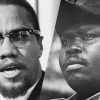By: Charles D. Ellison
So, there’s nothing new about a spoiled rich white dude saying crazy things so he can get a bump in a poll. On real, tell us something we don’t know about professional megaphone Donald Trump. Yet that’s all we spent much of this week munching on … while a conservative Supreme Court quietly considered how to best roll back 50 years of civil rights brought to you by our bloodied, beat-up, battle-weary ancestors.
Funny enough, we were so caught up in the latest rhetorical best hits on the campaign trail that we took little notice and made no noise over two crucial cases that slowly snaked their way into oral arguments Monday and Wednesday. Both cases could fundamentally reshape or effectively destroy core pillars of the civil rights movement: voting rights and affirmative action.
Whichever way either case goes, it’s not looking good. The highest court in the land can’t seem to stay off the subject. As if black people (clearly the aggrieved) are the ones actively oppressing, Supreme Court justices keep eagerly tinkering with issues that were settled quite a while back.
“The petitioners in these cases are looking to reopen precedent that’s been around for 50 years,” Liliana Zaragoza, an NAACP Legal Defense and Educational Fund litigation fellow and lawyer who’s worked feverishly on both cases, told The Root. “We’re opening up cases that have long been confirmed by the court.”
Putting faith in this particular high court to decide the fate of voting rights and affirmative action is potentially putting history on a five-decade reverse course: What would the nation look like if the civil rights movement had lost key fights? Suddenly we’re ending up in a parallel universe, a sloppy purgatory mixed with present racial tensions and refreshed assaults on critical legal, policy and political gains that African Americans hold near and dear.
One case, Evenwel v. Abbott, would—especially if it goes south—arguably be the most impactful policy decision since the Voting Rights Act of 1965, and it could be the most consequential decision since the three-fifths clause in the Constitution. Evenwel challenges state legislative districts apportioned by raw population. It would remove from the count those who can’t vote—immigrants and children, for example. The other, Fisher v. University of Texas, could mark the complete destruction of affirmative action—or, at the very least, a bizarre reconfiguration.
What makes both cases suspect is that they’re both underwritten and filed by the same crunchy band of fringe conservative legal insurgents, the Project on Fair Representation, led by former stockbroker Edward Blum. He and his donors have a thing for picking cases and plaintiffs that have big racial chips on their shoulders: If PFR isn’t pushing the Evenwel or Fisher case up the federal legal ladder, it’s winning the seminal Shelby County v. Holder case in 2013 or the pregame Northwest Austin Municipal Utility District Number One v. Holder, both of them providing the one-two knockout punch that gutted the very necessary Voting Rights Act.
Now, with the outfit receiving funding from a number of shadowy and very rich conservative donors, PFR could very well be on track to two more legal Super Bowl wins—in the name of what is, real talk, white-collar white supremacy. The plaintiffs in Evenwel are putting a detonation device on the age-old principle of “one person, one vote”: the essence of every vote being counted. Without it, blacks and women would never have had the right to vote; nor would there be as many (if any) black and Latino elected officials as there are today (even if we still have a long way to go in that category).
But the folks at PFR argue that the Constitution should be stingy about that, so let’s just erase kids, immigrants, ex-felons, prisoners and intellectually disabled folks from the voter rolls forever. Let’s just create a really bad slippery slope that, essentially, redefines the legal definition of a person, shall we? Should the high court agree with Blum, Evenwel opens the door to political manipulation and discrimination that could destroy voting rights for tens of millions of people and ultimately dramatically redraw congressional districts to the point where many black members of Congress disappear. It won’t stop there, either.
On the tail of Evenwel is Fisher, an affirmative action case that is, actually, its own remarkable rerun. We’ve been here before. In this case, an annoyingly misguided power-tripping white high school senior with a brat complex (Abigail Fisher) sues the University of Texas upon assuming (later disproved by ProPublica’s Hannah Jones) that she didn’t get admitted there from high school because, she wrongly presumed, less-qualified students of color had taken her place. She conveniently moved on to another school—but she couldn’t resist the temptation to keep her hustle flowing.
That case ended up punted back to the lower federal court in 2013. Still, something really fishy just happened: Somehow, the PFR cats managed to persuade the Supreme Court to take another look at it. Fisher II—PFR director Blum’s cut—will finally decide the fate of affirmative action.
If Fisher gets her way, Tel Aviv University researcher Sigal Alon told The Root, black student admissions to elite universities could drop by 50 percent. Meaning: It’s the end of affirmative action, not just in college admissions but in job hiring, too.
“[With this court] it creates a real challenge for any sort of race or civil rights case that comes before the court because the justices have a very different view of race and their interpretation of the law,” said Jon Greenbaum, chief counsel for the Lawyers’ Committee for Civil Rights Under Law. Greenbaum, who’s also been working against both cases, still makes an attempt at nervous optimism on the outcome, explaining the meandering twists, turns and contradictions that conservative legal minds make for themselves in both cases. “It’s unlikely the court will say you can’t have affirmative action. There will be some form of affirmative action. The question is on what is allowed.”
But what could be allowed doesn’t offer much hope, since the court won’t leave the issue be. The basic political math in the court’s current composition explains that. Let’s not kid ourselves into illusions of court impartiality: High-court justices are ideological representations of the presidents who pick them. In many ways, the game in many of these cases is already called before decisions are made.
The politically red hue of the court has been much sharper in recent years, with four justices (including Chief Justice John Roberts) leaning conservative and four justices leaning liberal: The aging Justice Anthony Kennedy is typically characterized as a “moderate” tiebreaker, but he’s pretty much center right. There’s no guarantee that he’ll move in favor of keeping “one person, one vote” or affirmative action intact, since he was no friend in Shelby, Northwest Municipal or Fisher I.
And so, here we are … again. On a slim thread awaiting imminent doom. Conveniently, judging from the Trumped-up preoccupation of the headlines, we don’t even know what’s coming next.
Charles D. Ellison is a veteran political strategist and a contributing editor at The Root. He is also Washington correspondent for the Philadelphia Tribune, a contributor to The Hill, Sunday Washington insider for WDAS-FM in Philadelphia and host of The Ellison Report, a weekly public-affairs magazine broadcast and podcast on WEAA 88.9 FM Baltimore. Follow him on Twitter.














